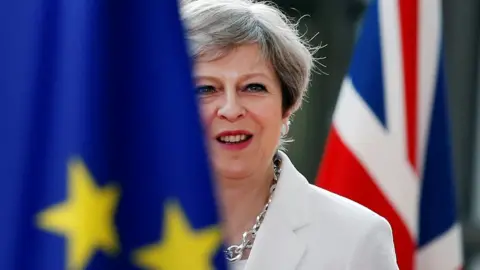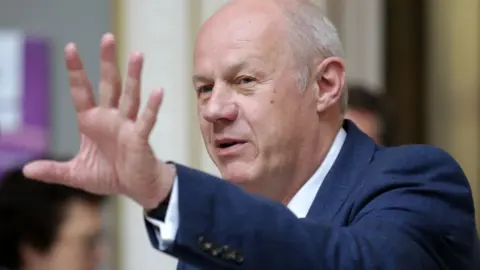Brexit: PM appeals to backbench Tories over repeal bill
 Reuters
ReutersTheresa May has appealed for unity from pro-EU Conservative MPs as the Commons is set to debate the government's Brexit repeal bill on Thursday.
The bill, seen as a key plank of the government's Brexit policy, transfers EU law into UK legislation
Mrs May has said there will be proper scrutiny, but some MPs fear it will give ministers sweeping new powers.
Brexit Secretary David Davis said this was "nonsense" and all Tories should back it as it ensured "continuity".
Labour has said that while it backs the principle of the bill, it will not give the government a "blank cheque to pass powers into the hands of ministers".
First Secretary of State Damian Green warned that if Tory MPs backed Labour attempts to amend the bill it would increase "the threat of a Corbyn government".
The prime minister said the legislation, known officially as the European Union (Withdrawal) Bill, was "the single most important step we can take to prevent a cliff-edge for people and businesses".
She said the bill delivered the result of last year's EU referendum, adding that "now it is time for Parliament to play its part".

The repeal bill
- Formally known as the European Union (Withdrawal) Bill, the draft legislation is a key plank of the government's Brexit strategy
- The first line of the bill says the European Communities Act 1972, which took Britain into the EU, will be "repealed on exit day"
- This will end the supremacy of EU law and stop the flow of new regulations from Brussels
- But all existing laws derived from the EU will continue to be in force - they can be changed or scrapped by further legislation
- The bill does not detail policies line-by-line but transfers all regulations into domestic law
- It gives the UK two years after Brexit to correct any "deficiencies" arising from the transfer

Mrs May added: "We have made time for proper parliamentary scrutiny of Brexit legislation and welcome the contributions of MPs from across the house."
In an article in the Sunday Telegraph, the prime minister's de facto deputy Mr Green said that "no Conservative wants a bad Brexit deal", and a potential rebellion threatened to strengthen Labour's position.
But former minister and Remainer Anna Soubry told the Observer that attempts to frustrate changes to the repeal bill would amount to "a trouncing of democracy and people will not accept it".
She added that it was "outrageous" to suggest pro-EU Tories supported Jeremy Corbyn.
'Completely wrong'
The legislation is not supported by the Labour Party, which has requested changes in six areas, including guarantees that workers' rights will be protected.
Shadow Brexit secretary Sir Keir Starmer said the government's approach to the process was "completely wrong", as it was reserving the power for ministers to overhaul existing EU laws and regulations after Brexit without any Parliamentary scrutiny.
"This is not about frustrating the process, it is not giving government a blank cheque to pass powers into the hands of ministers," he told BBC One's Andrew Marr Show.
"You could entrench important EU rights on Monday and take them away on Tuesday without primary legislation."
But Mr Davis told the programme Labour knew the legislation was necessary to ensure an orderly Brexit and was acting cynically in an attempt to destabilise the government.
Asked what his message to Tory MPs was, he said: "Everything that is significant in terms of changes will be done in separate primary legislation, on immigration, customs you name it.
"This bill is about ensuring continuity. Every MP, whether leaver or remainer, should support this bill."
The Scottish and Welsh governments have also raised concerns about the repeal bill, with Welsh First Minister Carwyn Jones describing it as a "naked power-grab".
 PA
PASeparately, Downing Street has rejected reports the prime minister is preparing to approve a £50bn financial settlement with the EU after the Conservative Party conference in October.
According to the Sunday Times, a close ally of Mrs May said her negotiating position with Brussels had been weakened because of June's election result, in which the Conservatives lost the Commons majority they had won in 2015.
A spokesman for No 10 said the claims were "not true".
Britain's divorce bill with the EU has been frustrating talks with negotiators in Brussels.
During the third set of talks between the UK and the EU, Europe's chief negotiator Michel Barnier said Mr Davis needed to "start negotiating seriously".
